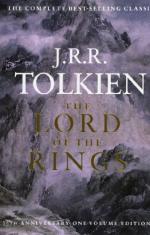|
This section contains 1,477 words (approx. 5 pages at 300 words per page) |

|
When Bilbo Baggins chooses to rush out of his hobbit-hole without his handkerchief and accompany some disreputable dwarfs on a dangerous and seemingly impossible venture, Tolkien makes it quite clear that he is choosing rightly. By opting for hardship instead of comfort and (more important still) Romance instead of everyday life, he is, we know, choosing the life of imaginative experience. Wizards, elves, dragons and treasure are, as well as being superbly real in themselves, symbols for various aspects of this life. Bilbo returns a better person for having lived it, and is promptly classed by his fellow-hobbits as "queer." Imagination, then, says Tolkien, is a good thing, but most men do not want it. It involves a conscious decision to brave not only the unknown, but also the scoffs and sneers of those "sensible" people who live right next door. Through the metaphor of the journey, and...
|
This section contains 1,477 words (approx. 5 pages at 300 words per page) |

|


